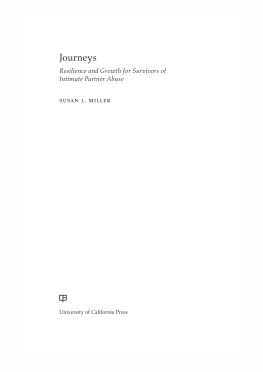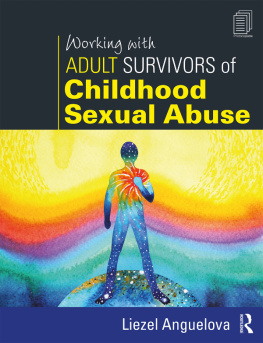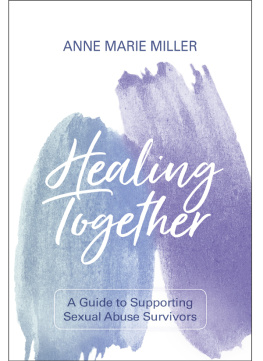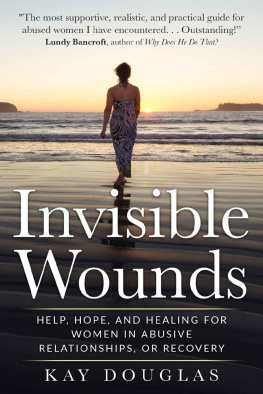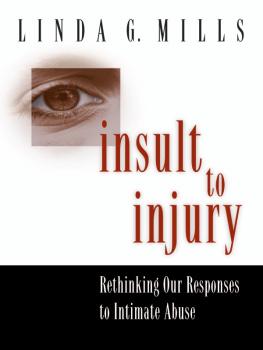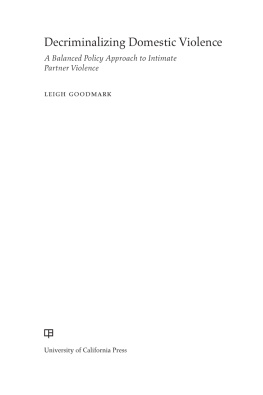Acknowledgments
No book is ever written in isolation. I am surrounded by many people who enrich my life, support my goals and dreams, and offer comfort, adventure, insight, and tenderness at just the right times. I first would like to acknowledge the women who participated in this projecttheir grace and strength and selflessness are laudable and very much appreciated. My chosen field of study keeps me in contact with people whose lives I find inspiring. The women behind the stories in this project are humble, determined, vulnerable, and courageous. They falter at times but persevere despite the volatility of their lives. They are astute problem solvers, a trait that applies to all survivors, not just the ones portrayed here who left their abusive relationships. I am impressed by their unshaken integrity, their commitment to their children and others they cherish, and their determination to keep moving forward. They have not stayed stuck ruminating but instead have used their experiences to help themselves and others. I thank you all for your time, your graciousness, and your openness and willingness to share your personal stories. I hope my work amplifies your voices and demonstrates how people can grow, rebound, resist, and hope in the face of trauma, fear, and abuse. These women are inspiring, but so are other survivors of abuse who may still be trying to start their journey to live violence-free. I applaud all of you.
This book also owes much to my own sources of support: family, friends, and colleagues. I am deeply nourished by their care. My beloved parentsmy first storytellers and exemplars of social justice activistspassed away during the writing of this book, and my friends and family provided much support when my own resilience faltered. A big shout-out especially to my twin sister Lisa, my son Connor, and my cousins Kathy Miller Gillmore and David Miller for all of their love and restorative laughter.
I owe a big debt to LeeAnn Iovanni for her incisive comments on earlier drafts of this manuscript and for fun times in Denmark and on the Delaware beaches. Heres to many more years of true friendship! I am so fortunate to have many wonderful friends and colleagues to thank as well for conversations and distractions: the Joseph DeRosa Sr. family, the Becker family, Lisa Bartran and Janna Lambine, Michelle and Morgan Meloy, Georgia and Arthur Scott, Nancy Getchell, Lisa Larance, Kim and Ray Book, Blanche and Stephanie Creech, Frank and Ellen Scarpitti, Lisa Hull, Joan Klint, Leslie Sherman and David Wakeley, Lisa Laffend, Toni Essner, Mareta Gallagher and my fun-loving book group, Melanie Stone, Angela Gover, Rosemary Barberet, Sue Osthoff, Kristen Hefner, Emily Bonistall Postel, Ronet Bachman, Margaret Stetz, Jennifer Naccarelli, Cynthia Burack, Gerry Lewis Loper, Ruth Fleury-Steiner, Alesha Durfee, and the awesome birthday womenCarol Post, Jessica Schiffman, Debbie Hegadus, and Judy Schneider. Thank you to my graduate school professors at the University of Maryland who honed my thinking and research skills, and inspired me in ways I still feel today: Ray Paternoster (Emperor of Wyoming, whose memory lives on), Sally Simpson, and Vernetta Young. I appreciate the expert transcribing help from Carolyn Peck and Stephanie Creech, and office support from Deanna Nardi-Gurcz; a big shout-out also to so many of our wonderful graduate students at my university with whom I have collaborated on research projects or had the pleasure to teach. Finally, I must acknowledge the many welcome interruptions from the newest member of our family, Max the wonder dog, in addition to the girls who camp out in my office, cats Sophie, Molly, and Pippi.
Perhaps it has become obligatory to thank ones editors, but here I cannot be effusive enough. The team of Maura Rossner and Claire Renzetti is one that all authors wish for. Their support, insight, and caring, not to mention their supersmart input, were invaluable. I thank them with much enthusiasm. The insight from editorial assistant Sabrina Robleh and the reviewers, the production expertise of Emilia Thiuri, and the superb copy editing by Elisabeth Magnus are also reflected in the book, and I thank all of them with much gratitude for their careful reading.
Preface
More than one in three women in the United States have experienced rape, physical violence, and/or stalking by an intimate partner in their lifetime (Black et al. 2011). In this book I refer to these actions as intimate partner violence and abuse (IPV/A). I made a deliberate choice to use IPV/A rather than IPV or IPA or domestic violence ( DV ), since IPV/A is a broader term that encompasses a wide range of victimizing acts committed by a previous or current dating partner, lover, or spouse. Most intimate partner abuse does not consist of the stereotypical physical violence but rather is best characterized by coercive control (Stark 2007) and other behaviors such as financial abuse (Adams et al. 2008), stalking, pet abuse (Hardesty et al. 2013), cyberstalking (Southworth et al. 2007), spiritual abuse (Dehan and Levi 2009), proxy abuse (Melton 2004, 2007), and paper abuse (S. Miller and Smolter 2011; overall, see also Belknap 2015, 39293). I also recognize that nonphysical abuse can be more frightening (Crossman, Hardesty, and Raffaelli 2016) and can cause greater long-term trauma and emotional scars for some victims/survivors than physical violence (Fleury-Steiner, Fleury-Steiner, and Miller 2011). My acronym IPV/A is more inclusive: it can extend to some women in my study who did not count themselves as domestic violence victims because their abuser was not physically violent, but whose horrendous emotional abuse was nonetheless profoundly controlling and traumatizing. This term varies across disciplinesand thus practitioners and scholarswith some relying on the term domestic violence while others use abuse and maltreatment. I believe that domestic violence is a weak euphemism that does not fully convey the panoply of tactics and the gendered power aspects of this violence. Some of the women I interviewed, however, did use this term, and in being true to their voices I use their word choices when I quote from their narratives.

